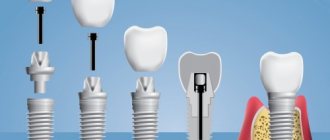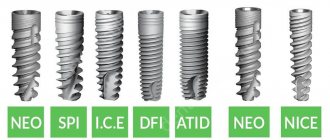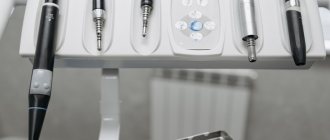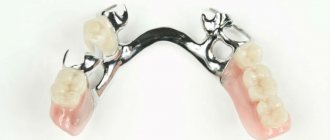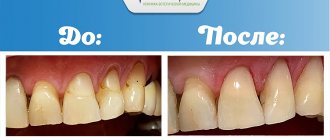Quite a strange question from a clinic that provides dental implantation services. But our task is not to install as many implants as possible, but to solve the problem with which you come to us, prepare you and honestly tell you about all the nuances, including the unpleasant ones.
So, there is an empty space in the dentition. Are you sure that implantation is what you need? And no wonder: in transport, newspapers, and on the Internet there are full of advertisements about the advanced method - dental implantation. Painless, long lasting, “set it and forget it”
,
“the tooth is like a native one”
and so on. Is it so?
Yes, yes. Nothing better has yet been invented in world dentistry. As a result, you will get a fixed tooth that will serve you without creating a load on the neighboring ones, which you will stop thinking about, just as you don’t constantly think about the rest of your teeth. But advertising remains advertising. They show you the end result - a beautiful smile, happy eyes, a healthy appearance. What will you have to go through to get the picture you want?
Let's ask patients who have already installed implants:
Nikolay, the operation took place in 2010: “What will you have to go through? Frankly speaking, a couple of circles of hell. Once you decide to get an implant, forget about long trips for a year - you will be tied to the clinic and the doctor who monitors the implant healing process. But I’ll be honest – the result is worth it...”
Preparation
First - stop smoking! Even if the implant takes root, it will not last long - for a smoker, if he does not want to give up his habit, it is better to forget about implantation - do not torture yourself in vain!
Second, you need to have time and patience. The implant takes root in different ways: for some it takes 2-3 months, for others it takes six months or more.
Zhanna, the operation took place in 2011:
“If you are a woman and are planning a child, choose one thing: dental implantation or pregnancy.
It is very difficult to combine both without harming yourself or your unborn child. The doctor forbade me to breastfeed after the operation...” Get ready to donate blood and have a CT scan of your jaw. Ideally, you should come to a consultation with an implantologist with a disk on which your 3D image is recorded - this will speed up the decision-making process and bring the surgery time closer.
Dental implants "Rusimplant"
This brand of Russian implants began its work in 1998. Initially, the company's products were produced under the brand name LIKO, but in 2009 the company changed its name and now produces implantation systems under the Rusimplant brand. The company is a joint Russian-German venture, has a research center in Germany, the production of dental implants is carried out using the best equipment purchased from Japan, Switzerland and the USA.
Russian dental implants "Rusimplant" have their own characteristic features:
For the production of systems, grade 4 titanium alloy is used, which has high biocompatibility with natural tissues of the human body, strength, and hypoallergenicity;
The shape of the implants is cylindrical, making it possible to firmly install the rod into the bone
jaw tissue. Russian implants “Rusimplant” have a unique external coating – Smart, which ensures accelerated osseointegration of the artificial root;
The manufacturer provides a 15-year warranty on its products.
Surgery and postoperative period
The process itself will be painless and short-lived - you will be given good local anesthesia and the implant will be quickly installed. But even here there is a pitfall: you may need an operation called a sinus lift.
— implantation of artificial bone if yours has atrophied. The procedure is short but expensive. It is usually carried out during implantation in the area of the upper front teeth.
Gennady, the operation took place in 2011:
“Immediately after the operation they will not let you go home - they will give you ice and force you to hold it against your cheek for 20-30 minutes.
Be prepared to take antibiotics. To prevent infection, the doctor will prescribe you a whole course. Talk to your gastroenterologist about restorative therapy in advance. In any case, I simply needed a gastroenterologist for my pancreas.” Elena, the operation took place in 2012:
“Don’t wait until the anesthesia starts to wear off—take a painkiller.
Otherwise, you will have to experience severe pain that will not go away within 2-3 days. During this time, take any pain medication your doctor prescribes or that usually works for you. Don’t torture yourself - your pain is not needed by anyone, and, above all, by yourself. I had to take a long sick leave to come to my senses...” Temperature, weakness, swelling, numbness, inflammation are your possible companions. The best thing you can do for your body after surgery is to establish bed rest, at least for 1-2 days, and preferably for 3-5. Do not go to crowded places, do not play sports or lift heavy objects, do not sunbathe.
In the first week, establish a diet - exclude salty, spicy, sour, and hard foods. Forget about alcohol!
The next day, a week, a month later - control x-rays to monitor the process of implant healing and the absence of complications. Here you can expect: suture dehiscence, reimplantitis (inflammation of the bone tissue around the implant), implant rejection. Then the process will last for several more weeks - in the worst case, the implant will have to be reinstalled. Be prepared for this situation as well.
Anna, both operations took place in 2013:
“Honestly, there were several moments when I wanted to give up everything.
It seemed to me that doctors were playing it safe, and without any reason. I was afraid to go to the appointment and take a picture, because I didn’t want to hear the phrase “Come back in 2 weeks, it’s too early.” I had the implant installed again, and I was ready to give up my idea. But I was well supported by my husband, parents, nurses and the doctor himself - and when, finally, everything was left behind, I was happy. Previously, it seemed to me that I would never dare to do this again, but now, after 2 years, I am beginning to understand that nothing could be better than an implant...” Follow all the doctor’s recommendations, then the risk will be minimal. Do not hesitate to arrive before your appointment, or call the clinic if your condition worries you.
Approximate costs at this stage:
- Operation to install an implant (possibly repeated) – from 25 thousand rubles
- Sinus lifting (possibly) – from 20 thousand rubles
- Control x-rays – from 1000 rubles, depending on the required quantity.
- Necessary medications – from 2 thousand rubles
Peculiarities
Implants are made from grade 4 and 5 titanium. VTK dental implants are processed using the company’s unique technology - Double Acid Etched Surface. The surface with microscopic roughness is quickly overgrown with bone tissue, which contributes to excellent initial stabilization of the implants.
Abutments with connections in the form of an internal or external hexagon with or without a Morse taper allow you to fix any orthopedic structure at an optimal angle - from a single crown to a complete denture. The precision and tightness of the connection prevent even minimal movement of the structure and the spread of bacteria at the interface between the implant and the abutment.
Installation of the healing abutment
When the doctor is sure that the implant has taken root, he will install a gum former for you. The name speaks for itself: the former is needed to prepare the gums for future prosthetics: installation of an abutment and crown.
Oleg, the operation took place in 2013:
“You know, after the operation and recovery, installing the shaper is just kindergarten, easy. It felt like a filling had been placed, at least in terms of time it was approximately like that. I spent 2 weeks with the former, and then they took impressions and put a crown on me within a month. Beauty!"
Approximate costs at this stage:
- Installation of a gum former: 5 thousand rubles
- X-rays (possibly) from 300 to 1200 rubles
Company goals
The abbreviation BTK combines Biocompatibility, Technology and Know-how. And in its mission, Biotec declares its desire to offer patients affordable and highly personalized solutions in the field of implantation, thereby improving their quality of life. The company's management strives to ensure that its products become the standard in the dental implants market. Biotec Academy regularly conducts training seminars around the world, including in Russia. However, so far the BTK brand clearly does not reach the industry leaders in popularity - Nobel Biocare, Straumann, Astra Tech.
Prosthetics on an implant
If everything else went well before this stage, then installing the abutment and the crown on top takes from a week to a month. Prosthetics on an implant is similar to conventional prosthetics, only the support is not your own tooth root, but a titanium one.
Irina, the operation took place in 2014
“Prosthetics began at the peak of my nerves. I am a suspicious person, and it seemed to me that they were deliberately dragging out deadlines for me (of course, nothing like that happened, but I later realized this), they were not telling me something. I was hysterical, cursing - it’s a shame to remember. Now, taking this opportunity, I would like to thank the doctors and other staff for their patience and care. And give advice to patients: be patient, and everything will work out! The prosthetics ended unexpectedly quickly (and I was determined to walk for a long time). One fine day I smiled in the mirror and burst into tears of happiness right in the doctor’s chair...”
Approximate costs at this stage:
- Temporary abutment (possibly) – 1850 rubles
- Temporary crown (possibly) – 1050 rubles
- Abutment: from 5 thousand rubles
- Crown: 18 thousand rubles
- Casts, models, fixation: from 2 to 3 thousand rubles
Quality control
The company carefully controls the quality of its products. Barcoding has been introduced into production; the entire process of manufacturing products is automated and takes place on the latest high-precision equipment. Quality is monitored by a specially developed computer system Manny (“Manny”). All BTK implants are accompanied by documentation confirming compliance with European quality standards ISO 9001 and ISO 13485. Moreover, you can trace the history of each product from manufacturing to installation. After implantation, the patient is given a special implant passport, which contains all the information about it.
Implant aftercare
You are happy about your new teeth, but do you remember the first conversation with the doctor, even before the whole procedure began? He told you about mandatory oral hygiene, using special means:
- Toothbrush: at least 2 times a day and after every meal. Brush your teeth using massaging movements, alternating circular and sweeping movements.
- Dental floss (floss, superfloss). The spaces between teeth must be cleaned, otherwise plaque that is harmful to implants will accumulate there.
- Irrigator. Be sure to purchase it, because the irrigator is the savior and friend of your implants. A needle-thin stream of water will clean plaque from the area where the crown adheres to the gum, get rid of the unpleasant odor and prevent the destruction of the crown.
- Professional hygiene. Now you are a regular client of the dental hygienist. Once every six months you definitely (required!!!) need to do professional hygienic cleaning: ultrasonic plaque removal and AirFlow treatment
Alena and Konstantin, operations took place in 2015:
“We placed implants together, supported each other. Everything went well, and we understood that now we are more responsible for our teeth than before. After all, once we didn’t save them - we lost them, so now, having spent so much money and effort on implantation, I would like to observe the result for as long as possible. In general, a lot depends on the person himself: whether he smokes, whether he drinks often, whether he cares about his health... Previously, brushing your teeth took 2-3 minutes, now it takes 10-15, because you need to go through everything with an irrigator and floss..."
Basic criteria when choosing the best implants
- Good indicators of osseointegration. According to statistics, dental systems in the premium segment currently have this advantage: their survival rates reach 100%. This indicates that there is no risk of rejection of the structure;
- Flawless aesthetics in the long term. Based on the studies conducted, 6-10 years after the fixation of dental implants, the marginal bone located at the line of their contact with the gingival tissue undergoes shrinkage. However, if the manufacturer has provided special treatment for the thread and neck of the implant, this possibility is excluded;
- Guarantee period. When studying the question of which dental implant is better, reviews indicate that high-quality dental systems have an indefinite warranty period. However, the key factors here are: the level of professionalism of the specialist and the patient’s responsible attitude towards their health. If a person often does not follow basic rules of oral care and regularly overloads the installed structure, then the likelihood of problems occurring several years after fixing the implant increases significantly;
- Availability of a quality certificate. The assignment of a registered serial number to each model is a prerequisite for its use. At the same time, it must be certified, which avoids the risk of purchasing a counterfeit product and causing harm to the patient;
- Easy to fix. When studying dental implants and trying to figure out which ones are better, it is important to take into account the possibility of fixation when there is a significant lack of bone tissue. If the structure bypasses the osteoplasty procedure and can be immediately loaded with a prosthetic device, this confirms its impeccable quality. As a rule, such implantation systems are used with one-stage techniques. In addition, this parameter indicates that the manufacturer uses programs that make it possible to reproduce the entire treatment process in 3D format, and uses special navigation templates that ensure maximum accuracy of implant fixation and greatly facilitate this procedure.
Another priority factor for those trying to figure out which implants are the best is the cost of the design.
We cooperate directly with the manufacturer of premium systems, Strauman, which allows us to implement a flexible pricing policy and provide favorable conditions to every visitor.
Price
If the advertising brochure indicates a “turnkey” cost and it is very attractive, then it is better to clarify what exactly is included in this concept. Different centers interpret this concept differently. Is it simply the installation of an implant or is it a pin, the work of a doctor, an abutment (transitional element) and a crown? In a good clinic, the turnkey price includes all diagnostic and therapeutic procedures, no additional expenses. The patient immediately sees whether the service fits into his budget.
What affects the price
- Cost of the implant itself
The price range is quite significant. Traditionally, Swiss implants are considered premium products. Korean and Israeli - budget ones. German and American occupy an intermediate position. Chinese implants are a “pig in a poke”; you can never guess with quality.
- Installation protocol
The one-step protocol is more expensive. At first sight. After all, when installing implants with immediate loading, the number of visits is significantly reduced. This method requires less manipulation and the rehabilitation period is shorter. For a nonresident patient, this method can, on the contrary, save money. And there’s nothing to say about time.
One-stage protocol with immediate loading
However, it's always good to have a choice
. If the patient prefers a two-stage protocol, the price will be lower.
Two-stage classical implantation with delayed loading
- Clinic equipment
An ancient X-ray machine, inherited from Soviet dentistry, significantly saves money. It just gives out little information. Modern equipment is expensive, but the examination is detailed and takes into account all the features of anatomy.
- Qualification of doctors
Between a beginner and an experienced implantologist, the choice is obvious. But you have to pay for qualifications. The doctor invests in his training and improving his skills.
The patient invests in the quality of the procedure, in the ability to place an implant and forget about it.
- Additional manipulations
Sometimes, before installing an implant, it is necessary to sanitize the oral cavity, treat adjacent teeth, or stop the inflammatory process. This also affects the cost.
Main types of implantation
Valentina
When I decided to replace the old bridge with implants, I thought that the procedure was the same for everyone - they inserted an implant and put a prosthesis on it. But during the consultation I realized that this is really a whole science, an individual program is selected for everyone. So, for example, I was offered classical implantation. Now I’m waiting for complete engraftment, and I’m getting ready to use metal-ceramics. I hope this is forever!
Dmitriy
I had a classic implantation of one tooth. I am a supporter of proven and well-studied technologies, so I chose this option instead of the newfangled non-surgical implantation. I was afraid - it’s not a cheap idea, it’s better to do it “classically”.
Natalia
I wanted to get two classic implants, because my husband had them installed, and I like the result, but the doctors said that the bone was gone, and for the classic protocol it is necessary to do an implant first. I chose Amazing Price Dentistry, as a result, they planted bone material, did implantation, everything has already taken root and made impressions for the prosthesis. But what I want to say is that even with additional procedures, it cost me less than my husband, who fell for the offers of an expensive clinic.
Who is suitable for this or that implantation?
Often there are non-inflammatory or infectious causes that require tooth extraction. At the Dr. Martin clinic, patients can plan to restore a tooth with an implant before undergoing tooth extraction. Regardless of the method of implantation, preliminary diagnosis and preparation for prosthetics are necessary.
Dental implantation immediately after extraction can be performed if the indication for extraction was:
- severe destruction of the crown;
- cervical, acute-ringed, oblique or horizontal fracture of the tooth root;
- inability to perform tooth restoration.
Simultaneous implantation involves inserting a pin into a “fresh” hole. 1–2 hours pass between tooth extraction and implant installation. After the structure is installed, the hole can be sutured, or a temporary crown can be fixed to it.
It is recommended to prefer two-stage implantation when planning tooth extraction if:
- removal was performed due to dental disease;
- there is a deficiency of bone tissue;
- abnormalities of the jaw or dentition are diagnosed;
- there are infectious or inflammatory processes affecting the oral mucosa;
- removal was emergency without prior preparation;
- smoking addiction.
The two-stage implantation procedure takes place no earlier than 3 months, when the bone tissue is completely restored. You shouldn’t tighten it too much either, as the bone may begin to atrophy and neighboring teeth may shift.
The first stage will be preparation for implantation, which may include correction of bone tissue, treatment of teeth and oral mucosa, and other manipulations. The second stage is implant installation. The specialist opens the gum, drills into the bone and implants a pin. Features of implant installation depend on its model. The gum is sutured or a temporary crown is fixed. Over the course of 4–8 months, the implant takes root. Only after osseointegration is complete is a permanent crown attached to the structure.
What guarantees does the patient receive?
No matter what dentistry website you visit, there will be a lot of promises there. You can get confused. Or see the words “lifetime warranty” and decide – this is what you need. There is no need to rush, because there are different guarantees.
Implant warranty
It is she who will most likely end up with a lifelong sentence. All well-known manufacturers provide a lifetime warranty on their implants. Knowing that the pin will not rust, fall apart or oxidize is certainly nice. What happens if the implant does not take root? There are clinics that undertake reinstallation of the implant in case of rejection. Implantation is a complex, multi-stage process and I would like to be sure of the quality at all stages
Doctors' work guarantee
Here everything is not so rosy. Only dental centers that are confident in the professionalism of their implantologists and value their reputation take on such obligations. Only highly qualified doctors can deliver high-quality implants. Typically, warranties for doctors' work are not as long as for products. On average, this is 1, maximum 2 years. It is important to understand that the clinic bears responsibility under the contract in case of trouble. A large center will be in its place in 2 or 3 years, but a tiny dentistry can close at any time. Along with it, warranty obligations will disappear.
produces four main series of dental implants
LIKO-M
Universal model of Russian implants IRIS. It has excellent strength and reliability indicators, accelerated osseointegration, and is equipped with a system that prevents the risks of loosening and twisting of implants.
LIKO-M EVOLUTION
The implants of the series are used to perform surgery when the volume and height of bone tissue is insufficient. They can be used in express implantation because they provide high-quality primary stability and avoid injury to the jaw bone during installation.
LIKO-M SLIM
Implants from this line are used when there is insufficient bone height or low bone density. They have a minimal diameter - up to 3 millimeters, but at the same time provide high primary stability; they are most often used for the restoration of lateral incisors.
LIKO-M MINI
Systems from this line are used in mini-implantations, allow for firm fixation of removable orthopedic structures, and are suitable for patients with complete edentia.
The price of Russian IRIS implants is quite affordable for a wide range of patients - it amounts to 6,000 rubles per unit.
Calculate the cost of treatment by taking a short test in 20 seconds!
Do not delay your treatment, because in this matter time plays against us.
What about expensive and time-consuming?
Yes, implants are not cheap. But dentures and bridges need to be replaced regularly, but implants will last you for the rest of your life. And with “long” everything is no longer so simple. There are different implantation protocols. Two-stage procedures, also called classic, take several months. But now implants with immediate loading are becoming more common. In just one day, you can insert implants and crowns. No holes in the teeth or long waits. Temporary crowns carry the entire functional load without causing any hassle.
It’s not that expensive anymore and it won’t last long, but still, where is the best place to get dental implants?
There are several criteria that will help with your choice.





